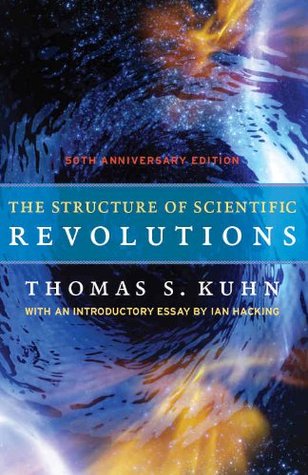More on this book
Community
Kindle Notes & Highlights
Read between
August 10 - September 4, 2021
But it is just this sort of change in the formulation of questions and answers that accounts, far more than novel empirical discoveries, for the transition from Aristotelian to Galilean and from Galilean to Newtonian dynamics. By disguising such changes, the textbook tendency to make the development of science linear hides a process that lies at the heart of the most significant episodes of scientific development.
And that means that theories too do not evolve piecemeal to fit facts that were there all the time. Rather, they emerge together with the facts they fit from a revolutionary reformulation of the preceding scientific tradition, a tradition within which the knowledge-mediated relationship between the scientist and nature was not quite the same.
In so far as he is engaged in normal science, the research worker is a solver of puzzles, not a tester of paradigms. Though he may, during the search for a particular puzzle’s solution, try out a number of alternative approaches, rejecting those that fail to yield the desired result, he is not testing the paradigm when he does so.
Therefore, paradigm-testing occurs only after persistent failure to solve a noteworthy puzzle has given rise to crisis. And even then it occurs only after the sense of crisis has evoked an alternate candidate for paradigm. In the sciences the testing situation never consists, as puzzle-solving does, simply in the comparison of a single paradigm with nature. Instead, testing occurs as part of the competition between two rival paradigms for the allegiance of the scientific community.
Verification is like natural selection: it picks out the most viable among the actual alternatives in a particular historical situation.
In the first place, the proponents of competing paradigms will often disagree about the list of problems that any candidate for paradigm must resolve. Their standards or their definitions of science are not the same.
Darwin, in a particularly perceptive passage at the end of his Origin of Species, wrote: “Although I am fully convinced of the truth of the views given in this volume . . . , I by no means expect to convince experienced naturalists whose minds are stocked with a multitude of facts all viewed, during a long course of years, from a point of view directly opposite to mine. . . . [B]ut I look with confidence to the future,—to young and rising naturalists, who will be able to view both sides of the question with impartiality.”
Max Planck, surveying his own career in his Scientific Autobiography, sadly remarked that “a new scientific truth does not triumph by convincing its opponents and making them see the light, but rather because its opponents eventually die, and a new generation grows up that is familiar with it.”
The transfer of allegiance fom paradigm to paradigm is a conversion experience that cannot be forced.
particularly persuasive arguments can be developed if the new paradigm permits the prediction of phenomena that had been entirely unsuspected while the old one prevailed.
If this description has at all caught the essential structure of a science’s continuing evolution, it will simultaneously have posed a special problem: Why should the enterprise sketched above move steadily ahead in ways that, say, art, political theory, or philosophy does not?
For many centuries, both in antiquity and again in early modern Europe, painting was regarded as the cumulative discipline.
It can, however, only clarify, not solve, our present difficulty to recognize that we tend to see as science any field in which progress is marked.
Does a field make progress because it is a science, or is it a science because it makes progress?
We have, for example, already noted that once the reception of a common paradigm has freed the scientific community from the need constantly to re-examine its first principles, the members of that community can concentrate exclusively upon the subtlest and most esoteric of the phenomena that concern it. Inevitably, that does increase both the effectiveness and the efficiency with which the group as a whole solves new problems.
products of a process that moved steadily from primitive beginnings but toward no goal. The belief that natural selection, resulting from mere competition between organisms for survival, could have produced man together with the higher animals and plants was the most difficult and disturbing aspect of Darwin’s theory.
That problem—What must the world be like in order that man may know it?—was not, however, created by this essay. On the contrary, it is as old as science itself, and it remains unanswered.


